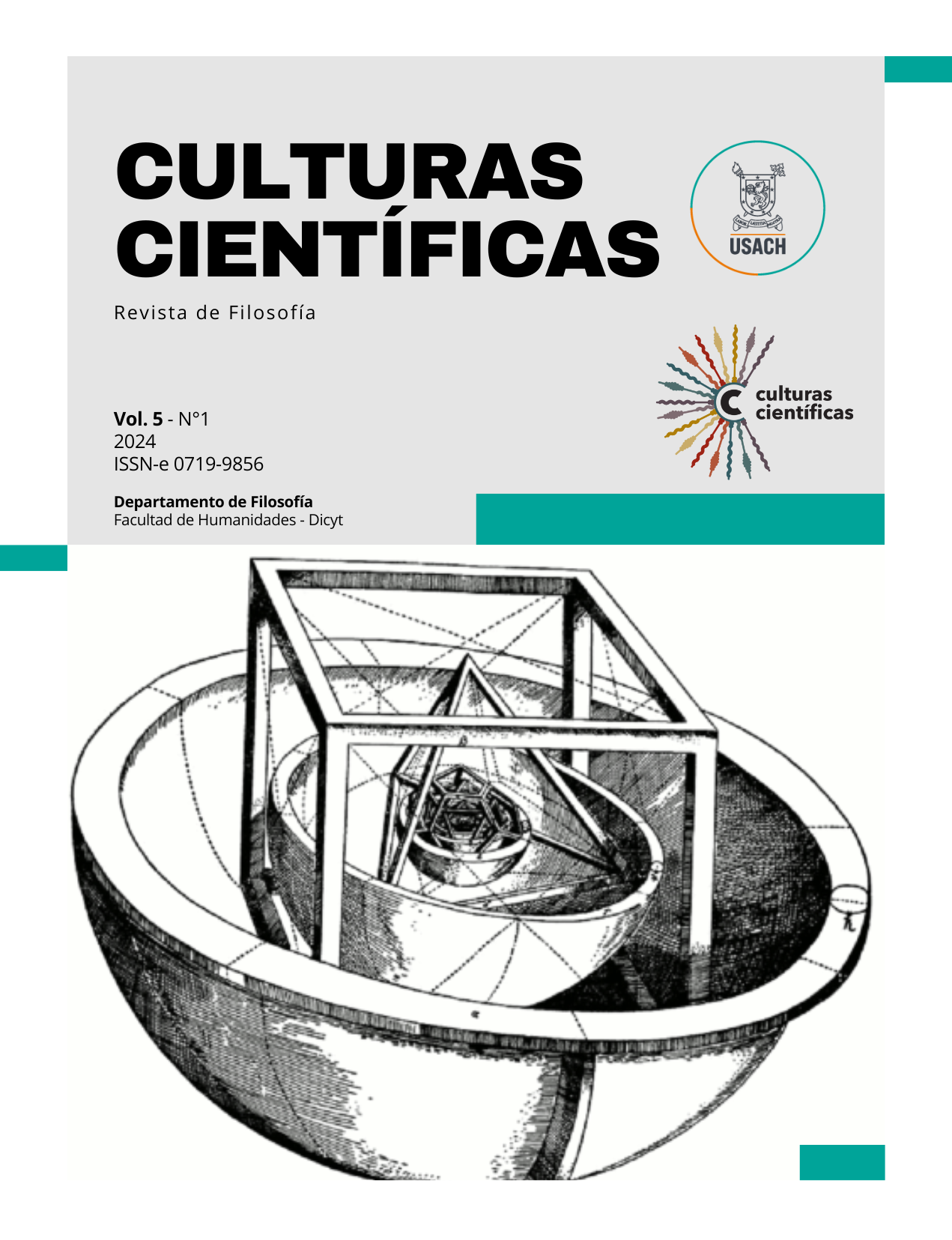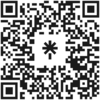Tendiendo Puentes: Los Themata de Holton y su Nexo con Marcos Filosóficos Establecidos en la Investigación Científica
DOI:
https://doi.org/10.35588/cc.v5i1.6702Palabras clave:
imaginación, investigación científica, Categorías de Kant, paradigmas de Kuhn, programas de investigación de LakatosResumen
Este artículo examina la rica textura de los themata de Holton. Holton argumenta que dentro de las normas racionales establecidas hay espacio para elementos subjetivos, incluida la imaginación científica. Sostiene que estas influencias entre pares, conocidas como themata, no solo no obstaculizan el progreso científico, sino que también sirven como un conducto para nuevos descubrimientos científicos. El objetivo del artículo es obtener una comprensión integral de su impacto en la academia y la investigación científica, investigando su posible convergencia o divergencia con otros marcos cognitivos en la filosofía de la ciencia, como las categorías de Kant, los paradigmas de Kuhn y los programas de investigación de Lakatos. Al comparar los themata con estos marcos bien establecidos comúnmente utilizados para desentrañar el conocimiento y la investigación científica, este estudio tiene como objetivo aclarar posibles confusiones y profundizar nuestra comprensión de la influencia a menudo pasada por alto o subestimada ejercida por los themata en la ciencia. En un sentido específico, esta investigación destaca el papel vital desempeñado por la imaginación y las estructuras de pensamiento preexistentes en la formulación y avance de teorías científicas. A través de este análisis, se proporciona una comprensión integral de la esencia de los themata, destacando la importancia de reconocer y comprender los themata como componentes esenciales de la investigación científica en ciertos momentos. Como resultado, esta investigación refuerza la validez de la afirmación, objeto de debate continuo, de que los datos empíricos, la experiencia matemática o el razonamiento lógico por sí solos no pueden suplantar a estos componentes integrales.
Descargas
Referencias
Agassi, J. (1973). Continuity and Discontinuity in the History of Science. Journal of the History of Ideas, 34(4), 609‑626. https://doi.org/10.2307/2708892
Anouk Barberousse, Denis Bonnay, and M. C. (Éd.). (2018). The Philosophy of Science: A Companion. Oxford University Press.
Anouk Barberousse; Max Kistler; Pascal Ludwig. (2000). La philosophie des sciences au XXe Siècle. Flammarion.
Aristotle. (s. d.). Posterior Analytics.
Barbosa, J. (2020). Themata e Paradigmas: dois conceitos epistemológicos distintos, mas com relações [Themata And Paradigms: Two Epistemological Different Concepts But With Relations]. Aufklärung: journal of philosophy, 7(3), 33‑42. https://doi.org/10.18012/arf.v7i3.52344
Barbosa, J. (2022). A thematic approach to selection effects and biases in cosmology: Fred Hoyle and the rejection of the big bang idea, despite the experimental observations. Belgrade Philosophical Annual, 35. https://doi.org/10.5937/bpa2235007b
Boirel, R. (1972). L’invention (4e édition). PUF.
De Mey, T. (2006). Imagination’s Grip on Science. Metaphilosophy, 37(2), 222‑239. https://doi.org/10.1111/j.1467-9973.2006.00432.x
Fabrizio Macagno, D. W. (2010). What we hide in words: Emotive words and persuasive definitions. Journal of Pragmatics, 42, 1997–2013. https://doi.org/10.1016/j.pragma.2009.12.003
Gava, G. (2023). Kant’s Critique of Pure Reason and the Method of Metaphysics. Cambridge University Press.
Gerring, J. (1999). What makes a concept good? A criterial framework for understanding concept formation in the social sciences. Polity, 31(3), 357‑393.
Godfrey-Smith, P. (2021). Theory and Reality: An Introduction to the Philosophy of Science (second). The University of Chicago Press.
Gracia, J. J. E. (2000). The Language of Categories: From Aristotle to Ryle, via Suárez and Kant. In Rencontres de Philosophie Médiévale (p. 337‑355). https://doi.org/10.1484/M.RPM-EB.3.1044
György Kampis, Ladislav Kvasz, M. S. (2002). Appraising Lakatos: Mathematics, Methodology, and the Man (M. S. G. K. Ladislav Kvasz (Éd.)). Springer.
Hacking, I. (2001). Aristotelian Categories and Cognitive Domains. Synthese, 126(3), 473‑515. http://www.jstor.org/stable/20117121
Harvey, L. (2022). Social Research Glossary, Quality Research International. http://www.qualityresearchinternational.com/socialresearch/
Holton, G. (1956). A Heuristic Model for the Growth Process of Modern Physical Science. Synthese, 10(1), 190‑202. https://philpapers.org/rec/HOLAHM
Holton, G. (1973). Thematic Origins of Scientific Thought: Kepler to Einstein. Harvard University Press.
Holton, G. (1993). Science and Anti-Science (2e éd.). Harvard University Press.
Holton, G. (1996). The Role of Themata in Science. Foundations of Physics, 2, 1‑7. https://dash.harvard.edu/bitstream/handle/1/42639307/The Role of Themata in Science.pdf?sequence=1&isAllowed=y
Holton, G. (1998a). The Advancement of Science, and its Burdens : With a New Introduction. Cambridge, MA: Harvard University Press. http://nrs.harvard.edu/urn-3:HUL.InstRepos:23975381
Holton, G. (1998b). The scientific imagination (MA: Harvard University (Éd.)).
Holton, G. (2000). Einstein, History, and other Passions : The Rebellion Against Science at the end of the Twentieth Century. Cambridge, MA: Harvard University Press. http://nrs.harvard.edu/urn-3:HUL.InstRepos:23975375
Holton, G. (2005). Perspectives on the Thematic Analyses of Scientific Thought. Victory and Vexation in Science: Einstein, Bohr, Heisenberg, and Others, 135‑151. http://nrs.harvard.edu/urn-3:HUL.InstRepos:37894289
Holton, G., & Yehuda, E. (2014). Albert Einstein, Historical and Cultural Perspectives: The Centennial Symposium in Jerusalem. Princeton University Press.
Holton Gerald. (1988). Thematic origins of scientific thought: Kepler to Einstein (Revised ed). MA: Harvard University Press. http://nrs.harvard.edu/urn-3:HUL.InstRepos:23975383
Hourya, B.-S. (1999). Introduction /Introduction. Revue d’histoire des sciences, 52(3‑4), 339‑341. https://doi.org/https://doi.org/10.3406/rhs.1999.1359
Ibarretxe-Antuñano, I., & Mendívil-Giró, and J.-L. (2014). To be or not to be a word : new reflections on the definition of word (I. Ibarretxe-Antuñano & J.-L. Mendívil-Giró (Éds.)). Cambridge Scholars Press.
Invernizzi, M. (2017). The Role of Developmental Word Knowledge in Achieving Fluency. Michigan Reading Journal, 49(2, Article 10), 1‑6. https://scholarworks.gvsu.edu/mrj/vol49/iss2/10
Jacques, F. (1985). L’espace logique de l’interlocution - Dialogiques II. PUF.
Jacques, F. (1989). « Contexte de justification et contexte de découverte : Une réévaluation ». In Karl Popper et la science aujourd’hui, Colloque de Cerisy. Aubier.
Jared, W. (2022). The A Priori Without Magic (S. Hetherington (Éd.)). Cambridge University Press.
Jaspers, K. (1960). Way To Wisdom: An Introduction to Philosophy (R. Manheim (Trad.)). Yale University Press.
Jorritsma, R. N. (2022). How well does evolution explain endogenous retroviruses?—A Lakatosian assessment. Viruses, 14(14), 1‑15. https://doi.org/10.3390/v14010014
Kahn, C. H. (1978). Questions and Categories: Aristotle’s Doctrine of Categories in the Light of Modern Research. Springer.
Kant, I. (1998). Critique of Pure Reason (Paul Guyer and Allen W Wood (Éd. et Trad.)). Cambridge University Press.
Kant, I. (2006). Anthropology from a Pragmatic Point of View (Robert B. Louden with an introduction by Manfred Kuehn (Éd.)). Cambridge University Press.
Kind, A. (2022). Imagination and Creative Thinking. In K. Frankish (Éd.), Amy Kind. Cambridge University Press.
Kipfe, B. A. (2021). Encyclopedic Dictionary of Archaeology (2nd éd.). Springer Nature Switzerland AG. https://doi.org/10.1007/978-3-030-58292-0
Kremer-Marietti, A. (1992). Thêmata. In Encyclopédie philosophique (M-Z) : Les notions philosophiques, Tome 2, Paris, PUF, (p. 2580). PUF.
Kuhn, T. S. (2012). The Structure of Scientific Revolutions (4. ed.). The University of Chicago Press.
Ladrière, J. (1981). Courants d’antiscience, causes et significations. (Actes de Colloque) Secrétariat International des Questions Scientifiques, Science et Antiscience, coll. Recherches et Débats – nouvelle série 1.
Lakatos, I. (1989). The Methodology of Scientific Research Programmes: Philosophical Papers. Volume 1 (J. W. and G. Currie (Éd.)). Cambridge University Press.
Laudan, L. (1977). Progress and its problems : towards a scientifique theory of growth. University of California Press.
Léna, S. (2009). Introduction à l’épistémologie. Nouvelle édition revue et augmentée [d’un chapitre]. Ellipses.
Malolo-Dissaké, E. (2012). Grammaires de l’objectivité scientifique. Au coeur de l’Epistémologie de Karl Popper (Dianoia (Éd.)).
Matalon, B. (1996). La construction de la science. De l’épistemologie à la sociologie de la connaissance scientifique. Delachaux et Niestlé.
Merton, R. K. (1975). Thematic Analysis in Science: Notes on Holton’s Concept. Science,New Series, 188(4186), 335‑338. http://www.jstor.org/stable/1739319
Morin, E. (1990a). Science avec conscience. Nouv. édit. Editions du Seuil.
Morin, E. (1990b). Science avec conscience (Nouv. édit). Editions du Seuil.
Murphy, A. (2022). Imagination in science. https://doi.org/10.1111/phc3.12836
Ogundele, Emmanuel Adetokunbo; Ogunyomi, A. I. (2020). A Critical Assessment of Thomas Kuhn’s Understanding of Scientific Progress. Caribbean Journal of Philosophy, 12(2), 62‑77.
Philippe, M.-D. (1978). Lettre à un ami. Itinéraire philosophique. Téqui.
Popper, K. (2005a). The logic of scientific discovery. In Routledge (Éd.), The Logic of Scientific Discovery. https://doi.org/10.4324/9780203994627
Popper, K. (2005b). Unended Quest: an Intellectual Autobiography (2nd éd.). Taylor and Francis.
Press, S. James.; Tanur, J. M. (2001). The Subjectivity of Scientists and the Bayesian Approach. Wiley.
Psillos, S. (2022). « Realism and Theory Change in Science » (E. N. Z. & U. Nodelman (Éd.)). The Stanford Encyclopedia of Philosophy (Fall 2022 Edition).
Quidu, M. (2009). The themata in sports sciences research: motivations and modalities of intervention. Cairn.Info, 2, 7‑25. https://doi.org/10.3917/sta.084.0007
Rabourdin, S. (2017). Les styles thématiques locaux : l’interprétation du réel par les Les styles thematiques locaux: l’interpretation du reel par les physiciens selon leur culture. Une etude comparative des physiciens indiens et francais autour de l’interpretation de la mecan [Claude Bernard-Lyon 1]. https://indecise.hypotheses.org/files/2016/11/Manuscrit-second-dépot-Sabine-Rabourdin-2017.pdf
Rebecca J. M. Gotlieb, Elizabeth Hyde, Mary Helen Immordino-Yang, and S. B. K. (2019). Imagination Is the Seed of Creativity. In J. C. Kaufman, And, & R. J. Sternberg (Éds.), The Cambridge Handbook of Creativity (p. 709–731). Cambridge University Press.
Reichenbach, H. (1961). Experience and Prediction: an analysis of the foundations and the structure of knowledge (Phoenix Books: The University of Chicago (Éd.)).
Sacchi, J.-C. (2000). Sur le développement des théories scientifiques: De l’aporie de l’incommensurabilité à la dimension pragmatique de la découverte. Editions L’Harmattan.
Sandberg, Jörgen; Alvesson, M. (2021). Meanings of Theory: Clarifying Theory through Typification. Journal of Management Studies, 58(2), 487‑516. https://doi.org/10.1111/joms.12587
Sokal Alan and Bricmont Jean. (2011). Intellectual Impostures. Postmodern philosophers’ abuse of science. Profile Books.
Soler, Léna; Sankey, Howard; Hoyningen-Huene, P. (2008). Rethinking Scientific Change and Theory Comparison: Stabilities, Ruptures, Incommensurabilities? Springer, Dordrecht. https://doi.org/https://doi.org/10.1007/978-1-4020-6279-7_24
Toulmin, S. (1974). Review of Science And Scientits: The Problem Of Objectivity, by Gerald Holton. Minerva, 12(4), 522–529. http://www.jstor.org/stable/41806228
Ullmo, J. (1969). La pensée scientifique moderne (coll. Cham). Flammarion.
Verneaux, R. (1972). Critique de la Critique de la Raison Pure de Kant (Aubier).
Wittgenstein, L. (2009). Philosophical Investigations (P. M. S. Hacker & J. Schulte (Éds.); 4th éd.). Wiley-Blackwell.
Descargas
Enviado
2024-05-20Publicado
Número
Sección
Licencia
Derechos de autor 2024 Georges ALAHOU

Esta obra está bajo una licencia internacional Creative Commons Atribución 4.0.











